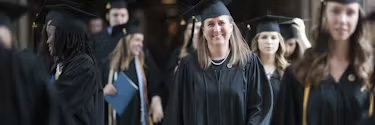
Adult Undergraduate Academics
Academics
Our adult undergrad programs—most of which are fully online—help busy adults achieve their academic goals. Whether you’re looking to finish a degree or planning to start one for the first time, we have a broad range of options that will help you start a new career or discover new opportunities in your current field.
Associate degree
Bachelor's degrees
What makes our programs unique?
Focused on real-world skills. Our professors have extensive experience in their fields and will mentor you in important life and work decisions. Our programs are designed to help you build skills that can be applied directly to your workplace.
Taught from a Christian perspective. You’ll explore faith and work integration, discuss important issues, and develop your whole character. This unique approach makes Bethel a truly transformational experience.
Online programs designed for adult students. We know many of our students work full time, have families, and are involved in their community while in school. Almost all of our programs are offered fully online, and our flexible class schedules will help you manage assignments, in-class requirements, and the other obligations in your life.
Free course resources. Most courses use free digital resources, saving you money on textbooks. Ask your enrollment counselor for more information.